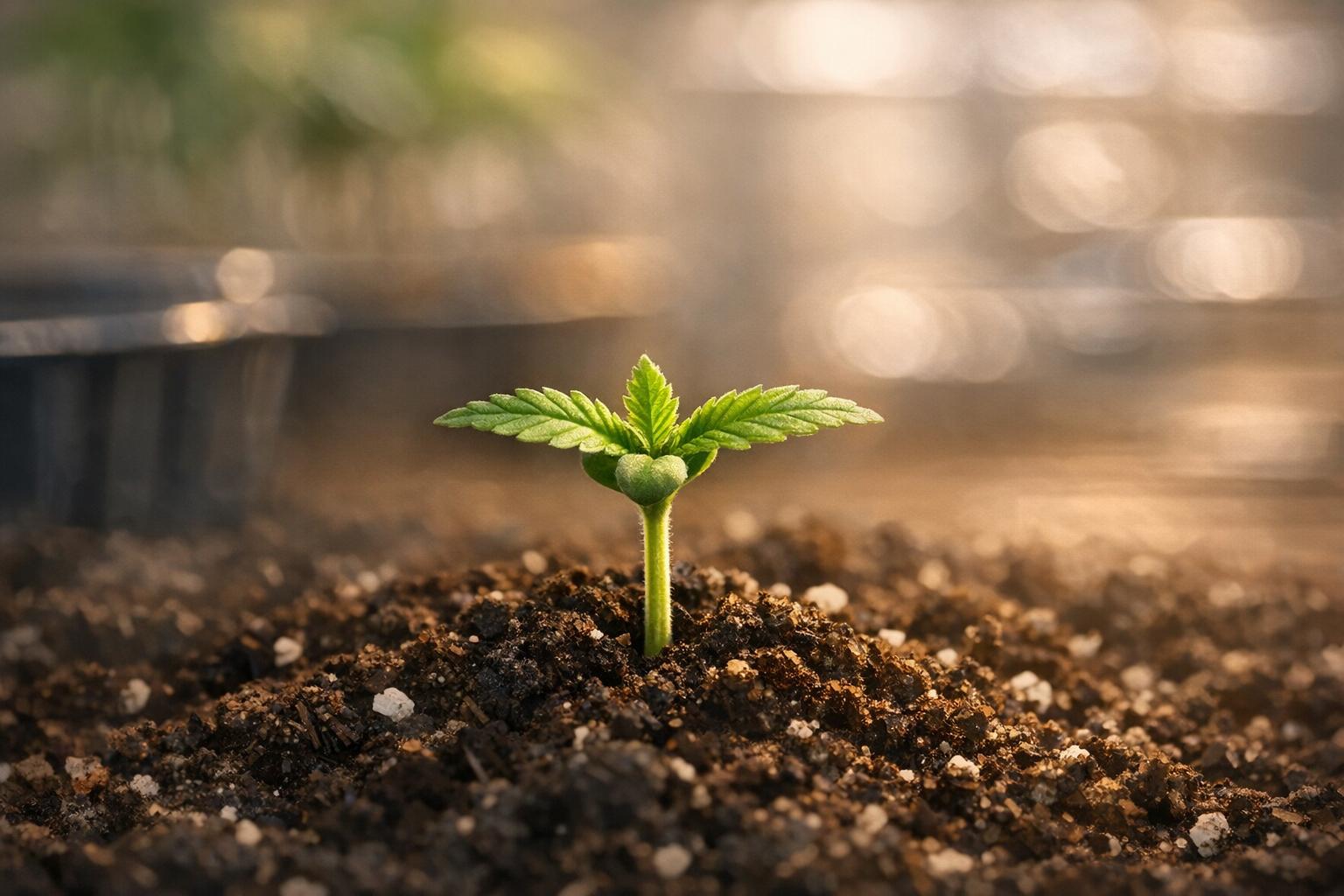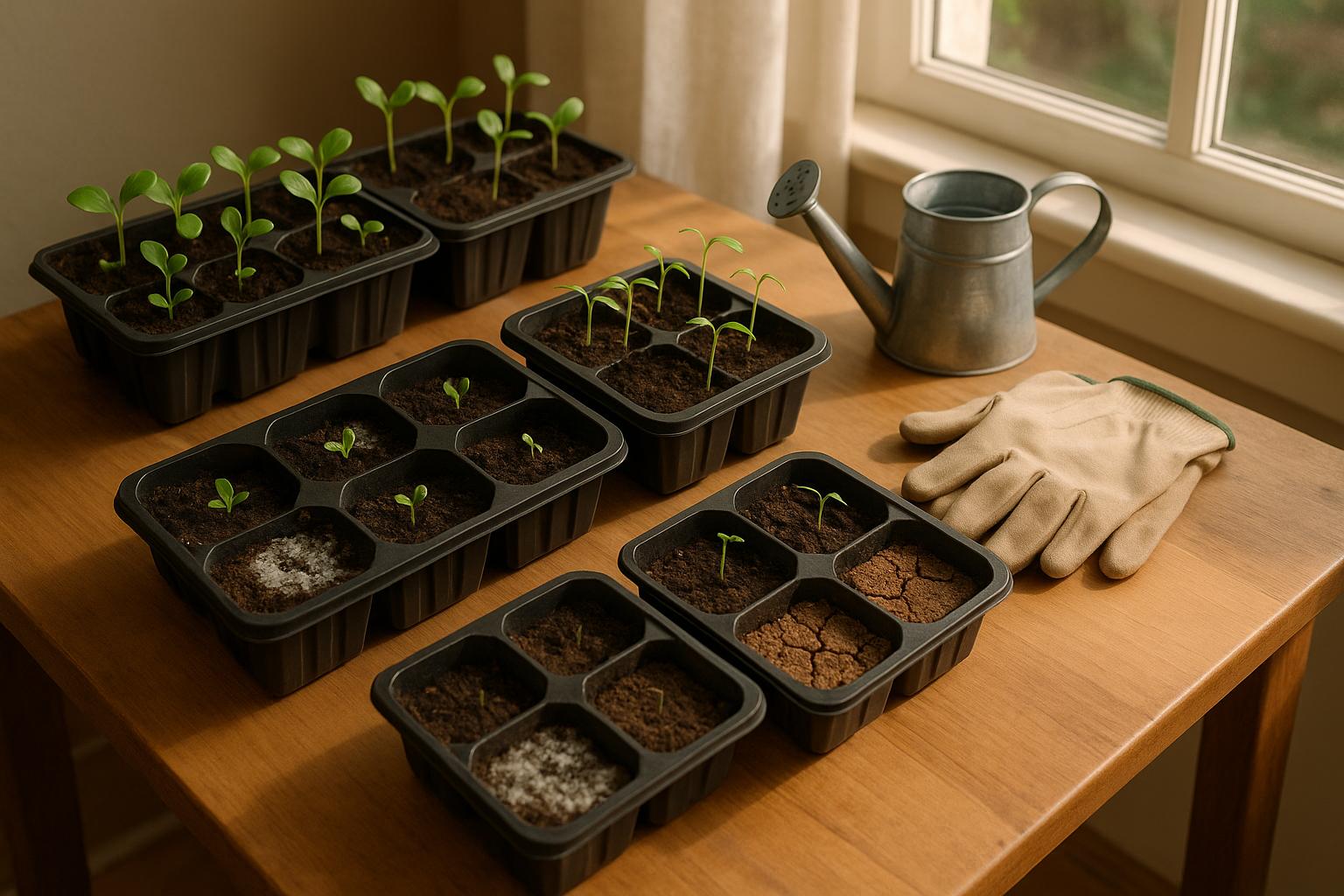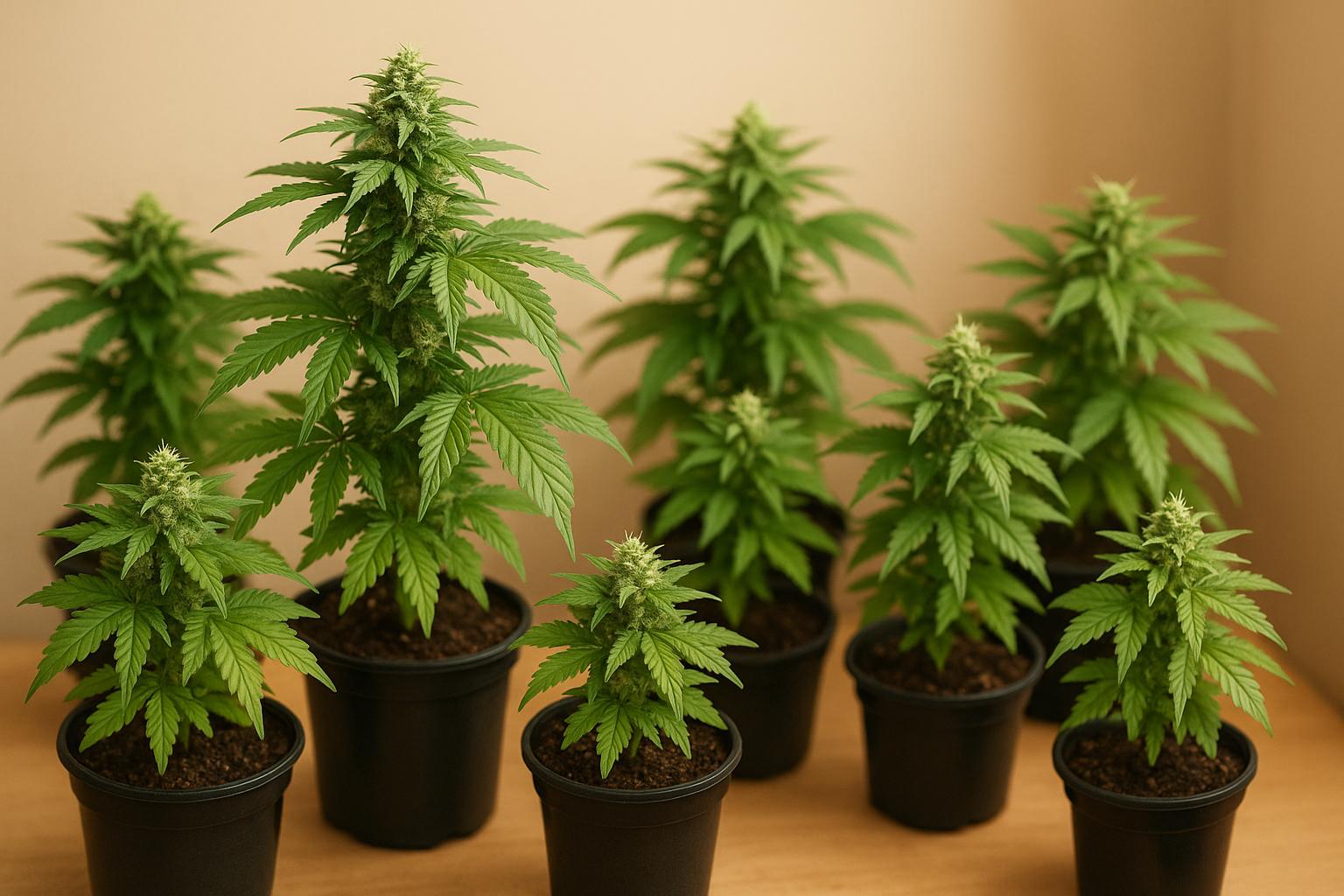Cannabis seed banks are essential for growers, offering a wide variety of seeds and preserving genetics for future cultivation. If you're planning to buy seeds in the U.S., here's what you need to know:
- Seed Types: Photoperiod Feminized seeds have become very popular in recent years because they produce only female plants, which produce flowers (buds). They eliminate the need to search for and discard male plants, which is necessary to prevent pollenating the female flowers (which will produce seeded flowers, which less than ideal for consuming). Not all breeders produce feminized seeds. Photoperiod Regular seeds, which produce male and female plants, are more traditional and natural. No human intervention is needed to produce regular seeds. They are easier to breed with and contain more variety in phenotypical expression. Autoflowering seeds produce plants that transition from the vegetative stage to flowering stage based on age (or stress event) rather than light exposure.
- Finding Reliable Seed Banks: Look for discreet shipping, secure payment options (like Bitcoin or credit cards), clear shipping policies, and strong customer reviews. Go here for a directory of US seed banks.
- Checking Quality: High-quality seeds are dark, firm, and have a slight sheen. Avoid pale or soft seeds. Reputable seed banks often guarantee high germination rates (80%-90%).
- Payment & Shipping for U.S. Buyers: Choose secure payment methods and seed banks offering discreet, trackable shipping. Many also provide reshipment policies for lost or delayed packages.
Whether you're a beginner or an experienced grower, selecting the right seed bank ensures a smooth start to your cannabis cultivation journey.
Top 5 Cannabis Seed Banks 2025 | Where to Get the Right Genetics
How to Find a Reliable Cannabis Seed Bank
Searching for a trustworthy cannabis seed bank can feel like a daunting task, but choosing the right provider is crucial for getting high-quality seeds and dependable service.
What to Look for in a Trustworthy Seed Bank
Discreet shipping is a must for U.S. customers who prioritize privacy. Seed banks like Seed Supreme and Herbies Seeds stand out by offering discreet USPS shipping. They use plain, damage-resistant packaging and sometimes even hide seeds in everyday objects to ensure they arrive securely and without drawing attention.
Secure payment options help protect your financial and personal information. ILGM and Herbies Seeds, for example, provide a variety of payment methods, including credit cards and Bitcoin. Bitcoin is particularly appealing for those seeking extra privacy, as it doesn’t require sharing sensitive banking details.
Data encryption is another layer of protection to look for. A reliable seed bank will use HTTPS connections and modern encryption technologies to safeguard your payment information and personal data from potential threats.
Transparent shipping policies show a company’s commitment to its customers. ILGM, for instance, offers free, discreet shipping across the U.S., complete with registered tracking for added peace of mind. Reputable seed banks clearly outline their shipping methods, estimated delivery times, and how they handle issues like lost or seized packages.
Legal Compliance and Privacy in the U.S.
A dependable seed bank will include legal disclaimers, reminding customers to follow their local cannabis laws. This not only demonstrates responsibility but also helps you stay informed about your obligations.
The ideal seed bank strikes a balance between accessibility and discretion. They make it simple to order and receive seeds while keeping your privacy intact. Up next, we’ll dive into seed types and quality standards to help you make an even more informed choice.
Cannabis Seed Types and Quality Standards
Understanding the different types of cannabis seeds and how to assess their quality can save you both time and money. Each seed type caters to specific growing needs, and knowing what to look for ensures you’re getting seeds that will germinate and grow into healthy, productive plants. Let’s break down the seed types and the key quality checks to help you secure reliable genetics.
Different Types of Cannabis Seeds
Feminized seeds are a favorite among home growers because they simplify the process. These seeds are bred to produce only female plants, which are the ones responsible for producing buds. Male plants, on the other hand, don’t yield usable flowers and can even pollinate females, leading to a harvest filled with seeds instead of dense buds. By choosing feminized seeds, you avoid the hassle of identifying and removing male plants during the grow.
Regular seeds contain a mix of male and female plants, typically in equal proportions. While these seeds require you to identify and remove male plants to prevent pollination, they are highly valued by breeders and some growers for their robust growth and flavorful results. However, the extra effort involved in separating males from females makes them less popular for beginners.
Autoflowering seeds are ideal for those new to growing or anyone looking for a low-maintenance option. These plants transition from the vegetative stage to flowering based on age rather than light exposure, making them easier to manage. Most autoflowering plants are ready for harvest within 8-12 weeks from seed, regardless of the light schedule. While they used to produce smaller yields and lower THC levels, modern advancements have significantly improved their potency, with some strains now exceeding 20% THC.
Once you’ve selected the type of seed that suits your needs, it’s time to ensure their quality with a few simple checks.
How to Check Seed Quality
A quick visual inspection can reveal a lot about seed quality. Look for seeds that are dark with a slight waxy sheen - often featuring tiger-stripe patterns of darker stripes or spots. Avoid seeds that are green, pale yellow, or white, as these are typically immature and unlikely to germinate.
Firmness is another key indicator. High-quality seeds feel solid when gently squeezed between your fingers. If a seed cracks or feels soft, it’s likely not viable. Additionally, fresh seeds tend to have a slight weight to them, whereas older or damaged seeds will feel lighter.
Germination rates are a critical measure of quality. Reputable seed banks often guarantee germination rates of 80%-90%, ensuring you get the most out of your purchase.
Genetic stability is something you’ll notice as your plants grow. Seeds from trusted breeders will consistently produce plants that match the advertised traits, such as height, flowering time, and effects. Unstable genetics, on the other hand, can result in plants with inconsistent characteristics, even within the same seed pack.
Proper storage also plays a role in seed quality. Seeds kept in cool, dark, and dry conditions can remain viable for years, but exposure to heat, light, or moisture can quickly degrade them. When buying seeds online, choose banks that prioritize proper storage and avoid sellers with questionable practices or old stock.
Lastly, try the float test to identify potentially weak seeds before planting. Place your seeds in a glass of room-temperature water. Healthy seeds will typically sink within a few hours, while hollow or damaged seeds are more likely to float.
sbb-itb-1add288
Payment Options and Shipping for U.S. Buyers
When buying cannabis seeds, secure payment methods and reliable shipping are critical for a hassle-free experience. Here’s what U.S. buyers need to know about payment options and shipping practices.
Safe Payment Methods
Credit and Debit Cards
Paying with credit or debit cards is a convenient choice when available. These methods often include buyer protection and dispute resolution features. However, not all seed banks accept card payments, and transactions may appear on your bank statement, which could be a privacy concern for some buyers.
Cryptocurrency Payments
Cryptocurrencies like Bitcoin and Ethereum have become popular among seed banks and customers alike. They offer enhanced privacy, though their fluctuating values can be a consideration.
Bank Transfers and Money Orders
Bank transfers provide a secure way to pay, though they may take a few business days to process and might include fees. Money orders are another option for those prioritizing privacy, but they usually require an in-person visit to a bank or postal service.
Cash Payments
Some seed banks still accept cash payments sent via registered mail with tracking. While this method can offer privacy, it carries a higher risk of loss during transit.
Reputable seed banks typically offer multiple payment options, allowing you to choose the one that aligns with your preferences for privacy, speed, and security. Some may even provide safeguards like reshipment policies in case of payment issues.
U.S. Shipping Guidelines
Discreet Packaging
Most seed banks use discreet packaging, such as plain envelopes and generic return addresses, to ensure privacy.
Delivery Timeframes
International orders can take longer to process, but expedited shipping is often available for an additional fee.
Shipping Costs
Shipping fees vary depending on the seed bank. Some offer free shipping for orders over a specific amount, while options like tracking or insurance may come with extra charges.
Reshipment Policies
Many seed banks have reshipment or refund policies for delayed or lost deliveries. These policies are designed to provide peace of mind if your package doesn’t arrive on time.
Tracking
Domestic shipments usually include reliable tracking updates, while international packages may have limited tracking once they reach U.S. customs. Seed banks often recommend waiting for customs clearance before assuming a package is lost.
State-Specific Considerations and Customs Processing
Although cannabis seeds typically contain minimal THC levels, some seed banks may avoid shipping to states with stricter cannabis laws. That said, most professional seed banks aim to provide nationwide shipping. Seed orders are carefully packaged to reduce the risk of delays or issues during customs inspections, though occasional random checks can occur.
How to Confirm Seed Quality and Avoid Problems
There’s no foolproof way to guarantee seeds are perfect, but there are several steps you can take to assess their quality and sidestep potential issues. Here’s how you can verify seed quality and ensure a smoother cultivation process.
Ways to Verify Real Seeds
- Visual Inspection and Testing: Follow earlier recommendations for visually checking seeds and performing viability tests. These steps can help you spot obvious issues before planting.
- Check Documentation: Look into the supplier’s product details and breeding information to confirm authenticity. Legitimate sellers typically provide clear and detailed documentation.
- Community Reviews: Tap into community feedback or online reviews to identify sellers with a good track record. Other growers’ experiences can be a helpful guide when choosing a supplier.
Taking these steps early can save you from headaches down the line.
Common Problems and How to Prevent Them
- Unreliable Sellers: Be cautious of sellers offering suspiciously low prices or incomplete product descriptions. These can be red flags for poor-quality seeds.
- Payment and Communication: Choose suppliers that provide secure payment methods and clear communication. Look for features like order confirmations, tracking updates, and responsive customer service.
- Shipping and Packaging: Opt for sellers who use sturdy packaging and provide clear delivery timelines. Also, check their policies for handling delays or lost shipments.
- Quality Control Issues: If seeds fail to germinate or plants grow with unexpected traits, it might point to poor storage or handling by the supplier. To minimize risk, start with a small order and research how the supplier manages their inventory.
Key Points for Choosing Cannabis Seed Banks
When picking a cannabis seed bank, it's all about finding the right balance between reputation, legal compliance, seed quality, secure payments, variety, and customer support. Here's what to keep in mind:
Reputation and Trustworthiness should top your checklist. Look for seed banks with a proven track record, transparent business practices, and easy-to-access contact information. Reliable suppliers will provide detailed product descriptions, breeding information, and maintain open communication throughout your buying experience.
Legal Compliance is crucial, especially for buyers in the U.S. Stick with seed banks that are well-versed in federal and state regulations and take privacy seriously. Many reputable companies clearly outline shipping restrictions and regularly update their policies to reflect changes in the legal landscape.
Seed Quality Indicators can make or break your growing experience. Choose suppliers who store seeds under proper conditions, offer germination guarantees, and provide detailed strain information, including THC/CBD levels, flowering times, and expected yields. Healthy seeds are typically dark, firm, and free from visible damage or signs of premature aging.
Payment Security and Shipping Reliability are non-negotiable. Trustworthy seed banks ensure secure payment options and reliable shipping, complete with discreet packaging and tracking details.
Variety and Specialization should align with your growing goals. Some seed banks focus on rare genetics and exotic strains, while others cater to beginners with easy-to-grow options that boast high germination rates. Whether you're a newcomer or an experienced grower, there are seed banks that cater to your specific needs.
Customer Support Quality can set great seed banks apart from the rest. Look for suppliers who respond quickly to questions, offer practical growing tips, and have clear return or replacement policies. Strong customer service shows a commitment to building lasting relationships, not just making a quick sale. To test this, consider placing a small order first.
Finally, start small with any new supplier. Ordering a limited number of seeds initially allows you to assess germination rates, shipping times, and overall service quality. This cautious approach helps you minimize risk and ensure a smooth start to your cultivation journey.
FAQs
What legal factors should I consider when buying cannabis seeds in the U.S.?
The legal status of buying cannabis seeds in the U.S. varies depending on your state’s laws. Even though cannabis remains a controlled substance under federal law, many states allow individuals to purchase seeds for recreational or medical growing. It’s essential to review your state’s specific regulations regarding seed possession, cultivation limits, and any required permits before making a purchase.
In states where growing cannabis is prohibited, seeds are often marketed as souvenirs or novelty items. Make sure the seed bank you’re buying from operates within legal boundaries and adheres to these restrictions. Staying informed about local laws can help you avoid any legal complications.
How can I make sure the cannabis seeds I buy will germinate successfully?
To boost your chances of successful germination, start by selecting seeds that are in good condition. Look for seeds with a firm shell, a slight sheen, and a darker color - these are often signs of quality. Steer clear of seeds that are cracked, pale, or feel soft, as these are less likely to thrive.
Testing seed viability before planting can save time and effort. A quick and easy method is the float test: drop your seeds into a glass of water and leave them for 24 hours. Seeds that sink are usually viable, while floaters might not sprout. Another reliable option is the paper towel method, where you place seeds in a warm, damp paper towel to see if they sprout before planting.
For the best results, always buy seeds from a trusted seed bank. Reputable sellers provide details about germination rates and often back their products with guarantees, ensuring you get fresh, high-quality seeds you can count on.
What should I do if my cannabis seed order is delayed or goes missing during shipping?
If your cannabis seed order is delayed or missing, the first step is to check the tracking information provided by the seed bank. This will help you confirm your package's current status. Delays can often happen due to customs checks or issues with the shipping carrier, so staying updated is crucial.
If your package remains delayed or is confirmed lost after the usual shipping timeframe (generally 14–28 days, depending on your location), reach out to the seed bank’s customer service team. Most reliable seed banks are willing to help by offering a reshipment or refund. However, they might ask you to wait at least 14 business days before filing a claim.
Make sure to keep all tracking details and any communication with the seed bank. These records may be needed if you’re asked to provide documentation. In some cases, you may also need to file a claim with the shipping carrier, such as USPS. Resolving these issues often requires clear communication and a bit of patience.



